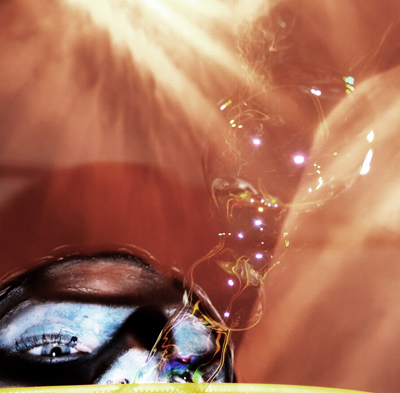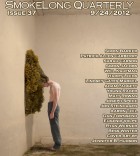What kind of scarecrow are we talking about—sack-face or pumpkin-head? And do you see a future in Scarecrow Lit, perhaps when we tire of vampires and zombies?
I love this question so much, in part because it’s concerned with something I hadn’t given much thought to: what’s this thing look like? I think in my own head I was concerned with its having identifiable human features, something like the classic Wizard of Oz scarecrow. That’s one of the things that makes scarecrows in general, and the one of the Wizard of Oz in particular, such sympathetic entities—they’re “us” but they’re not us, and they’re all alone out there, with whatever the elements throw at them. They’re so haggard and frayed!
Scarecrows might be a nice answer to the glittery, angsty vampires of Twilight (et al) or even the mindless, leering zombies of every good movie in that genre, neither of which do too well at reminding us of what it means to be human.
Your very short stories can either be disturbingly intimate or fable-like. Can you say anything about your narrator choices?
My narrators come in a great many forms. I think that’s one of the neatest things about writing: the perspective(s) you can choose to guide your story along. I have a lot of fun imagining what it could be like to be another person, so I go with first-person narration quite a bit. But I also like various forms of the third-person narrator, too, especially by sometimes toying with the notion that not only is this so-called omnipotent third-person narrator unreliable but s/he/it is also, maybe, an idiot. So my choice of narrator tends to vary. I’ve really subscribed to much of Donald Barthelme’s essay “Not-Knowing”—which concerns, among other things, approaching narrative (and narrator) with not much more than caprice. For me, it’s a way of avoiding contrivance. The concept works well with my particular writing style, too. A lot of my story ideas, and the narrators I attach to those ideas, come from lasting images I’ve acquired over the course of a given time range. Take that idea and that narrator, and let them out into a world governed by your particular rules, your own personal Twilight Zone.
Your prose is very direct, but the images poetic. What are your influences?
I enjoy and am indebted to reading really great writing. I’m an English teacher, so I find myself jumping back and forth from the canonical to the contemporary. Russian literature is amazing. I’ll just lump every Russian, regardless of era, together in that categorization: Nabokov, Gogol, Kharms, Petrushevskaya, and Chekhov. Tolstoy and Dostoevsky, too, but less so than the others aforementioned. There must have been something so funny about living under the oppression of the Czar and later the Communists. Herman Melville’s a big influence. Moby-Dick is truly a hilarious novel. Franz Kafka, Robert Walser, Bertolt Brecht. Much of The Theater of the Absurd and Roald Dahl, Shirley Jackson, and Kurt Vonnegut.
More contemporarily, George Saunders, Ben Loory, Amelia Gray, and Shane Jones. Then the Chicago people whose work I love dearly but who likewise have inspired me to continue writing my own fictions: Patrick Somerville, Lindsay Hunter, Russ Woods, Adam Levin, Ben Tanzer, Jac Jemc, James Tadd Adcox, Meghan Lamb, Chris Bower, Dan Shapiro, Mason Johnson, Natalie Edwards, Colin Winnette and A D Jameson.
Talk about Untoward Magazine, as well as any secret projects you’re working on.
I’ve been doing Untoward for a little over a year and a half now (Nov. 2010). We’ve published 22 “issues” to date—a volume of issues the internet affords but print does not (which is why we’re presently exclusive to the internet). And I say “issues” because I’ve more or less associated each month of our existence with a particular set of stories. I wish I were being more creative with how I categorize them, but it really just comes down to the order in which each story was received. That said, changes are in store. I’m getting a little tired out from the non-stop pace of the project and the constant need to be reading submissions. I’m in talks with others to hand over the reins of the site for a bit, although not end my involvement altogether. I’m feeling the need to recharge my batteries. Do other things for a bit.
As for the project itself, it came into being out of my desire to see a slightly different representation of literary humor than I felt it was getting already. I will argue this forever, humor and literature go hand in hand, just the same as drama and literature do. Every favorite “serious” work of literature of mine has made me laugh in some way. The reasons for this vary and are often complex. Humor in itself is a complex feature of writing. Why are certain things universally (and at least somewhat timelessly) considered funny? Can you have a more refined sense of humor, like a refined palate? It certainly sounds absurd. But that just adds to my interest. So I’ve adopted it as Untoward‘s main purpose.
Lastly, regarding other projects, I do have a story collection in the works, Why God Why, coming by way of Love Symbol Press, which is run by my friends Russ Woods and Meghan Lamb, who also publish Red Lightbulbs. The official date of publication remains up in the air, though—but soon, soon! I blog for Artifice Books when I can (working on something right now, actually). I’m also participating in a few anthology projects with specific themes. I’ll say no more than that, since I don’t want to be the guy who spoils any secrets. I hate being the guy who spoils secrets.



 The core workshop of SmokeLong Fitness is all in writing, so you can take part from anywhere at anytime. We are excited about creating a supportive, consistent and structured environment for flash writers to work on their craft in a community. We are thrilled and proud to say that our workshop participants have won, placed, or been listed in every major flash competition. Community works.
The core workshop of SmokeLong Fitness is all in writing, so you can take part from anywhere at anytime. We are excited about creating a supportive, consistent and structured environment for flash writers to work on their craft in a community. We are thrilled and proud to say that our workshop participants have won, placed, or been listed in every major flash competition. Community works.